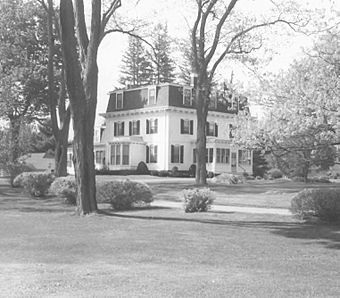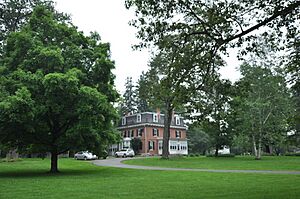Governor's House (Togus, Maine) facts for kids
|
Governor's House
|
|
|
U.S. Historic district
Contributing property |
|

Governor's House in 1973
|
|
| Location | Off ME 17, Togus, Maine |
|---|---|
| Area | 1 acre (0.40 ha) |
| Built | 1869 |
| Architectural style | Second Empire |
| Part of | Togus VA Medical Center and National Cemetery (ID12000826) |
| NRHP reference No. | 74000319 |
Quick facts for kids Significant dates |
|
| Added to NRHP | February 23, 1974 |
| Designated NHL | May 30, 1974 |
| Designated CP | October 3, 2012 |
The Governor's House in Togus, Maine, is a very old and important building. It's also known as the Director's Quarters at the Togus Veterans' Administration Center. This historic house is located on the grounds of a facility run by the U.S. Department of Veterans Affairs (VA).
Built in 1869, the Governor's House is special because it's the only building left from the very first National Home for Disabled Volunteer Soldiers. This home was started in Togus in 1866. Its purpose was to help soldiers who were hurt or sick after fighting in the American Civil War. Because of its history, the house was named a National Historic Landmark in 1974. This means it's recognized as a place of great national importance.
About the Governor's House
The Governor's House is a two-and-a-half-story building made of brick. It has a special type of roof called a mansard roof. The house sits on a strong foundation made of granite.
The main part of the house is three sections wide and three sections deep. It has windows with shutters and granite sills. The front of the house, which faces south, has a porch that is now enclosed. A two-story section extends from the back of the main house. In total, the house has 22 rooms. Most of its original wooden details are still there.
History of the Togus Facility
The area where the Togus VA facility is today was the very first place in the United States created to help veterans. The U.S. Congress decided to establish this facility in 1866. It was meant to be a home for "any worthy soldier" who was "suffering such a degree of disability." This meant soldiers who were too hurt or sick to take care of themselves.
The government bought the land from a summer resort that had gone out of business. This resort used to be popular because of local mineral springs. The new facility for veterans opened in 1866. Sadly, many of its main buildings were damaged or destroyed by a fire in 1868.
After the fire, the government started a big project to rebuild in 1868 and 1869. The Governor's House was built during this time. It was the home for the person in charge of the facility, who was called the governor (now called the director). Today, the Governor's House is the only building left from that major rebuilding effort. It is still used as a home today.
 | Valerie Thomas |
 | Frederick McKinley Jones |
 | George Edward Alcorn Jr. |
 | Thomas Mensah |




